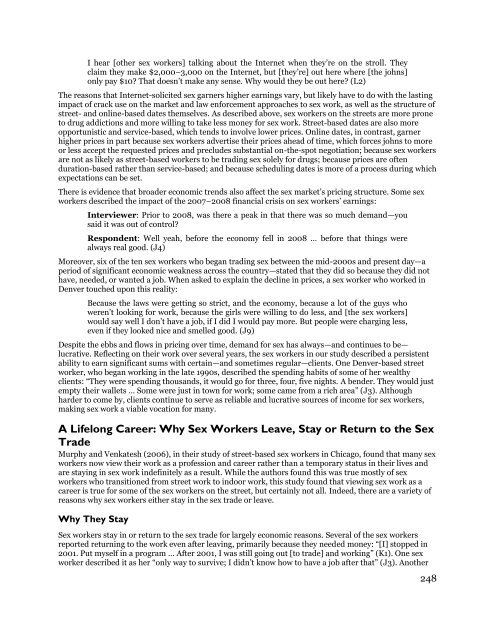413047-Underground-Commercial-Sex-Economy
413047-Underground-Commercial-Sex-Economy
413047-Underground-Commercial-Sex-Economy
Create successful ePaper yourself
Turn your PDF publications into a flip-book with our unique Google optimized e-Paper software.
I hear [other sex workers] talking about the Internet when they’re on the stroll. They<br />
claim they make $2,000–3,000 on the Internet, but [they’re] out here where [the johns]<br />
only pay $10 That doesn’t make any sense. Why would they be out here (L2)<br />
The reasons that Internet-solicited sex garners higher earnings vary, but likely have to do with the lasting<br />
impact of crack use on the market and law enforcement approaches to sex work, as well as the structure of<br />
street- and online-based dates themselves. As described above, sex workers on the streets are more prone<br />
to drug addictions and more willing to take less money for sex work. Street-based dates are also more<br />
opportunistic and service-based, which tends to involve lower prices. Online dates, in contrast, garner<br />
higher prices in part because sex workers advertise their prices ahead of time, which forces johns to more<br />
or less accept the requested prices and precludes substantial on-the-spot negotiation; because sex workers<br />
are not as likely as street-based workers to be trading sex solely for drugs; because prices are often<br />
duration-based rather than service-based; and because scheduling dates is more of a process during which<br />
expectations can be set.<br />
There is evidence that broader economic trends also affect the sex market’s pricing structure. Some sex<br />
workers described the impact of the 2007–2008 financial crisis on sex workers’ earnings:<br />
Interviewer: Prior to 2008, was there a peak in that there was so much demand—you<br />
said it was out of control<br />
Respondent: Well yeah, before the economy fell in 2008 … before that things were<br />
always real good. (J4)<br />
Moreover, six of the ten sex workers who began trading sex between the mid-2000s and present day—a<br />
period of significant economic weakness across the country—stated that they did so because they did not<br />
have, needed, or wanted a job. When asked to explain the decline in prices, a sex worker who worked in<br />
Denver touched upon this reality:<br />
Because the laws were getting so strict, and the economy, because a lot of the guys who<br />
weren’t looking for work, because the girls were willing to do less, and [the sex workers]<br />
would say well I don’t have a job, if I did I would pay more. But people were charging less,<br />
even if they looked nice and smelled good. (J9)<br />
Despite the ebbs and flows in pricing over time, demand for sex has always—and continues to be—<br />
lucrative. Reflecting on their work over several years, the sex workers in our study described a persistent<br />
ability to earn significant sums with certain—and sometimes regular—clients. One Denver-based street<br />
worker, who began working in the late 1990s, described the spending habits of some of her wealthy<br />
clients: “They were spending thousands, it would go for three, four, five nights. A bender. They would just<br />
empty their wallets … Some were just in town for work; some came from a rich area” (J3). Although<br />
harder to come by, clients continue to serve as reliable and lucrative sources of income for sex workers,<br />
making sex work a viable vocation for many.<br />
A Lifelong Career: Why <strong>Sex</strong> Workers Leave, Stay or Return to the <strong>Sex</strong><br />
Trade<br />
Murphy and Venkatesh (2006), in their study of street-based sex workers in Chicago, found that many sex<br />
workers now view their work as a profession and career rather than a temporary status in their lives and<br />
are staying in sex work indefinitely as a result. While the authors found this was true mostly of sex<br />
workers who transitioned from street work to indoor work, this study found that viewing sex work as a<br />
career is true for some of the sex workers on the street, but certainly not all. Indeed, there are a variety of<br />
reasons why sex workers either stay in the sex trade or leave.<br />
Why They Stay<br />
<strong>Sex</strong> workers stay in or return to the sex trade for largely economic reasons. Several of the sex workers<br />
reported returning to the work even after leaving, primarily because they needed money: “[I] stopped in<br />
2001. Put myself in a program … After 2001, I was still going out [to trade] and working” (K1). One sex<br />
worker described it as her “only way to survive; I didn’t know how to have a job after that” (J3). Another<br />
248


